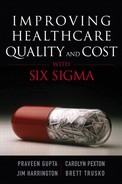Introduction
This book is an introduction to quality methods, Six Sigma, and healthcare. No doubt, if you purchase this book you are concerned about the quality issue and the future of healthcare. You have probably tried TQM (Total Quality Management), CQI (Continuous/Clinical Quality Improvement), and a number of other approaches to improving quality in your organization. We too have thought about this long and hard throughout the years as consultants, speakers, and writers in the healthcare field. You might be familiar with Dr. Brett Trusko’s work as a futurist who collaborated with the late Russell Coile Jr. Little did he know some 20 years ago that most of our work in healthcare would boil down to quality issues. We have spoken and written about quality, organizational development, motivation, teamwork, information technology, and finance in healthcare with a Pollyanna perspective that with enough caring and hard work we can solve the problems of healthcare. Only recently did we really begin to understand that all these issues were reflective of a dysfunctional system that works against excellence in healthcare.
For example, our healthcare system in the U.S. systematically rewards heroics and intervention while penalizing planning, quality, management, and effectiveness. For years we have reimbursed providers based upon costs while efficiency has generally resulted in lower reimbursements. In our capitalist economy, we usually find that the best provider of a good or service is the one that is the most efficient, not the least. But this is precisely how we handle healthcare in the U.S. The more healthcare resources we consume as providers of healthcare, the more reimbursements we receive. How would we feel about paying a mechanic more for replacing parts that our car doesn’t even need? How about rewarding grocery stores for finding the most expensive method of shipping groceries to the store?
Of course, healthcare providers aren’t mechanics, and hospitals aren’t grocery stores. Hospitals are hospitals and physicians are physicians. Healthcare is generally an imprecise science. However, using the excuse of an imprecise science as a reason not to improve healthcare is irresponsible. In fact, healthcare is an imprecise science, but at the same time there is much in healthcare that can and should be improved.
The authors have worked in healthcare for more than 60 years. We have been unit secretaries, surgical scrub technicians, and administrators. We have seen healthcare finances from the inside out and worked in the clinical setting. Healthcare is not an easy business. Healthcare professionals are some of the most dedicated and caring people on earth. When publications such as the May 1, 2006, edition of Time magazine (Gibbs, 2006) and morning news shows like The Today Show and others prominently feature stories about how to protect yourself from medical errors in a hospital, we would expect to see more healthcare professionals expressing outrage against the system. Dedicated, caring professionals are and should be outraged at the shallow investigative reporting. But the fact is that healthcare professionals usually don’t have a very good defense against attacks, because in most cases, they don’t really know what happened. They don’t know what happened because they don’t understand their processes, and they don’t understand their processes because the processes tend to be complicated and fluid.
As professionals who have worked in healthcare for so many years, we the authors can personally vouch for the fact that most healthcare providers strive for delivery excellence. These providers have witnessed miracles, such as the snaking of wires from the leg to the brain to clear a clot and save a life. They have seen two-pound premature babies live, and people on the verge of death brought back to living. Miracles of excellence happen constantly in the healthcare provider’s world. And when errors occur, healthcare professionals grieve. There may be no other profession or industry that is more driven by a desire for excellence in the world. Unfortunately, processes and systems created by misaligned incentives sometimes make it difficult to provide excellence. This is where discussion of Six Sigma really begins.
Six Sigma is an approach to quality that should appeal to healthcare professionals intrinsically. It is based on improving processes and procedures, based on evidence. One of our authors has a bachelor’s degree in biology, two have degrees in engineering, and others have diplomas in business. Dr. Trusko stated in one of our early writers meetings that when he first heard of Six Sigma years ago, it was like coming home. Of course, running a business requires making decisions based upon facts and not just intuition or politics. Unfortunately, this is exactly the way most healthcare provider institutions are run. Now throw into the mix the politics of government funding and insurance companies, and it’s no wonder we accomplish anything with healthcare. Not that governments and insurance companies are not trying to do the right thing; in fact, the motivation is based on doing the most good for the most people. Healthcare providers, in a relatively weak bargaining position due to the cottage nature of the industry, generally have to work within the system that the government and the insurance industry have created. But there are things that healthcare providers can do to increase efficiency, reduce malpractice costs, and increase profits. Even in a system that rewards resource utilization, having an intimate understanding of your business, your processes, and the influence you have on outcomes allows the healthcare provider to maximize its revenue while minimizing the anguish of medical mistakes.
